Manitoba correspondent Evelyn Rempel Petkau journeyed to Ethiopia last fall as part of a Canadian Foodgrains Bank-sponsored learning tour and reports her findings of the NGO’s work with Mennonite Central Committee, Meserete Kristos Church, and other relief and development agencies
Thirty years ago, the world was gripped by images of people ravaged by hunger in famine-stricken Ethiopia, ranked as one of the deadliest disasters of the 20th century. It was in response to that famine that the then newly formed Canadian Foodgrains Bank (CFGB) launched its very first response to hunger. Through the Foodgrains Bank and its member partners, Canadian farmers donated nearly 110,000 tonnes of food that was shipped to Ethiopia and distributed to the devastated areas.
Today, 30 years later, the Foodgrains Bank is still involved in Ethiopia. Of the 42 countries in which it is working, no country has more projects than Ethiopia. Currently, 14 different projects worth almost $4.6 million are operating throughout the country.
It’s not that Ethiopia is still in the throes of famine. The country has seen considerable progress and transformation in the area of food security since the 1980s.
Stu Clark, a Foodgrains Bank special policy advisor, writes that, although Ethiopia “has enjoyed close to double-digit economic growth for a decade and . . . Ethiopia’s government says it is on course to meet most of the Millennium Development Goals by 2015, and by 2025 . . . expects to be a middle-income country,” it remains in a precarious state of food insecurity.
While food aid expenditures “have declined, Foodgrains Bank expenditures for agricultural development in Ethiopia have increased over the past decade to about $1 million a year,” according to Clark.
The country’s progress has given the Foodgrains Bank opportunity to shift its focus from responding to hunger with handouts to enabling farmers to avert food crises.
Current challenges to food security
Ethiopia is a country that has the potential to feed its population, says Sam Vander Ende, who has lived in Addis Ababa and worked as a Foodgrains Bank field staffer for the past 20 years. However, he says it faces two very significant challenges that continue to dog food security: rapid population growth and climate change.
In the last quarter-century, the population has doubled, to nearly 97 million. At the same time, household land size has gotten smaller. The same amount of land is now needed to feed a greater number of people. Such rampant growth has put increased pressure on land and other resources.
Addis Ababa, a teeming and rapidly growing city, reflects the dichotomy of progress and poverty. Construction is happening at a phenomenal rate. Modern structures, concrete skeletons and eucalyptus scaffolding convey a city burgeoning with development. A sea of tightly packed shanties flows around and between these large structures, each metal roof bearing a satellite dish. Large multi-storied buildings that rise out of the rubble are becoming homes to the people who have been displaced from the shanties that used to sit on the land.
However, 85 percent of Ethiopia‘s population is rural. Many of them farm less than a hectare of land, land that is owned by the government. Unreliable rainfall can mean either a shortened growing season or excessive flooding. Cultivation practices over the years have contributed to environmental degradation. Mountainsides have been deforested, resulting in severe erosion of land and valuable topsoil being washed away. A way of life that has been practised for generations is being severely threatened.
MCC, Meserete Kristos Church involvement
Nowhere is the destructive force of climate change and conventional practices on land more glaring than in the Boricha District, where the Foodgrains Bank has partnered with Mennonite Central Committee (MCC) and the Meserete Kristos Church Relief and Development Association to address this issue.
Boricha is a chronically food-insecure region of Ethiopia. With its local partner, CFGB/MCC Ethiopia has been working in the area for more than a decade, initially with emergency food assistance, but increasingly with agriculture and livelihood training. The area has been hit by consecutive disasters that have negatively impacted the agricultural community. Hillsides are completely denuded not just of trees and flora, but also of soil, exposing brown rock gashed with deep ravines and huge gullies.
Descending down the slope of a steep hillside that was completely barren five years ago, associate project manager Solomon Teferi; MCC Ethiopia rep Peter Woolner of First Mennonite Church, Kitchener, Ont.; project manager Zerihun Zena; and food security officer Wondeassen Assefa explain to the learning tour the reclamation work that began five years ago.
Terraced rows of deep trenches were dug on the mountainside. Between the trenches, a variety of fast-growing leguminous trees were planted, fixing nitrogen into the soil. The work had begun at the top of the mountain and there the five-year growth is well-established.
More recent work of trenching and planting continues down the mountain, showing the stages of land gradually returning to its former self. The trenches catch the rainwater and allow it to soak into the ground, and the trees secure the soil, giving other plants a chance to take root.
A decade ago, farmers in the area abandoned their farms, moving to higher lands because of the degradation of their farmland. Recently, they have been moving back down and reclaiming their farms.
Elias Tola, a local farmer, tells us, “Before, my farm was a very rocky area because of wind and rain erosion. Now it is as you see. We are looking at good change. Now we are using conservation farming methods.”
He speaks with gratitude of the difference a road construction project—a food-for-work program supported by CFGB/MCC Ethiopia—has made: “Before, we couldn’t take our children to the health clinic. Now we can go anywhere.”
CFGB/MCC Ethiopia’s ongoing work of reforestation and land reclamation is done through cash-for-work programs from March through May, when food is available for purchase, and a food-for-work program during July and August, when food is getting scarce and expensive.
With 34 local staff working on environmental rehabilitation and infrastructure development, the Foodgrains Bank, MCC and Meserete Kristos Church are working together to meet the challenges of critical water issues, land degradation and erosion. Local staff are involved with teaching water and soil conservation methods, building check-dams and micro basins, reforestation, diversifying crops, and making available good quality seed and livestock. A cooperative yard site has been established, where seed is collected and a seed bank has been created.
Tola, 50 and a father of eight children, is chair of the cooperative. “The members had nothing before,” he says. “Before, they were leaving this dead and rocky land, but now they are returning. Now we are improving our lives. I am planting mangoes, avocadoes. I am diversifying my livelihood. My harvest is starting to improve three-fold and now I can pay the school fees and send my children to school.”
Conservation agriculture a big hit with local farmers
It’s the end of the rainy season, and the countryside looks lush and green compared to an early blast of winter back in Canada. The harvest is being brought in to the granaries and markets on the backs of donkeys and in ox-drawn carts.
It has been a good harvest for Ginjo. A pair of oxen pull the plow as he prepares the field for another season. He urges them on with his singing. “You are doing well. You are doing good to me,” he sings in his dialect as he leads them over the field.
What has made him so happy with the harvest this year is the yield that he got from the field where he used conservation agriculture methods. For the first time last March he planted a small field using no-tilling methods while applying compost and mulch. The yield was noticeably better. When the rainy season starts in March he looks forward to expanding the practice to other fields.
Tesfaye Falaha, director of the Terepeza Development Association, a partner of the Foodgrains Bank and World Relief Canada in Wolayta-Soddo, oversees this project in the hilly regions of Offa District and Kindo Koiysha District.
“We started promoting conservation agriculture with 42 farmers as a pilot proj-ect. Now there are more than 250 copy farmers,” Falaha says.
Like Ginjo, 60, farmers have been very impressed with the yields that come off these fields relative to fields farmed in a conventional manner. Ginjo hopes that this more-productive way of farming, which conserves both soil and water, will make it more viable to support his family of 10.
Development based on irrigation
The Afar region in the Rift Valley is home to many of the nine million pastoralists in Ethiopia who have followed their herds of goats, sheep and camels for millennia. They, too, are feeling the devastating impact of population growth and climate change. According to the seasons, they move with their herds from place to place in search of food, water and grazing land. Due to mounting pressure on pasture land and other factors, pastoralists are increasingly vulnerable to recurring droughts and have become increasingly dependent on food and relief assistance.
In Aura Woreda, Support for Sustainable Development and the Canadian Lutheran Church have partnered with the Foodgrains Bank to promote irrigation-based development. Providing food for work, they have constructed irrigation systems. In the last 10 years, they have diverted water from numerous rivers that flow from the highlands and have constructed 15 small-scale irrigation schemes. The final project is just months away from being completed.
Literally oases in the desert, the communities that form around these water diversion projects provide a lifeline for these pastoral groups. Changing from an age-old way of life is not fast or easy, but it is being energetically embraced by the Afar people as they recognize that their nomadic way of life is no longer sustainable.
An elder speaks on behalf of his community: “We used to walk 140 kilometres to the highlands to barter our livestock for food grain. Today, we are saved from those terrible times. Now we have reserve food. Now those people in the highlands come down here to buy our maize and sorghum. Now we have food here and there is no need for moving to the highlands to buy foodgrain. We have good water now, we have land and farming implements. Now we stand by ourselves. Now we see ourselves as human beings. Before, we saw ourselves as animals.”
“With all the local leadership that is emerging, it gives me hope that this will be sustainable,” says Woolner.
Solomon Teferi gets the last word: “People in North America who have never been here are sending their support. Thank you. It is bringing us hope and transforming the lives of people.”
See more stories at Hope in Boricha
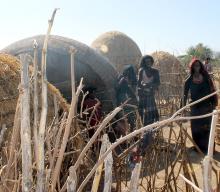
A way of life is being dramatically changed as the pastoralist people learn to grow crops. The Foodgrains Bank and Canadian World Lutheran Relief are working through the Support for Sustainable Development organization on food-for-work projects that build irrigation systems. They provide training on how to grow and market crops. (Credit: Evelyn Rempel Petkau)
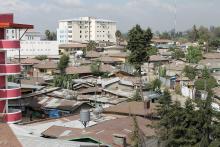
Ethiopia is a country undergoing transformation. Stu Clark, senior policy advisor for the Canadian Foodgrains Bank, writes, ‘The challenge now is to ensure that rural Ethiopians enjoy the same rapid growth as those in Addis Ababa [pictured]. While food aid expenditures have declined, Foodgrains Bank expenditures for agricultural development in Ethiopia have increased over the past decade to about $1 million a year.’ (Credit: Evelyn Rempel Petkau)
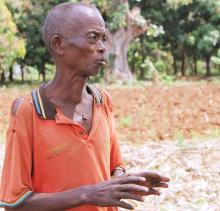
Ginjo struggles to support his family of 10 on a hectare of land. But by adopting new conservation methods of farming this past growing season he was able to dramatically increase the yield of his maize crop, which he harvested from the field in the foreground. (Credit: Evelyn Rempel Petkau)
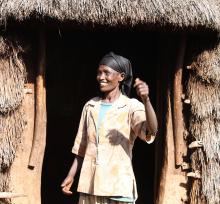
Mogite is a widow, but being part of one of the self-help groups that the Terepeza Development Association and the Foodgrains Bank have supported, she is able to support herself and her family. The women have established a cooperative garden on her property, where vegetables and seedlings are grown for their families and the surplus is marketed. (Credit: Evelyn Rempel Petkau)
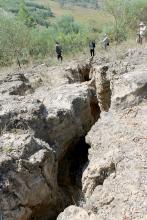
MCC Ethiopia and Meserete Kristos Church have partnered with the Foodgrains Bank in the Boricha District, where farmers are being paid to work on soil- and water-conservation activities, building terraces and check-dams to catch the rain, and planting trees to stabilize the soil. (Credit: Evelyn Rempel Petkau)
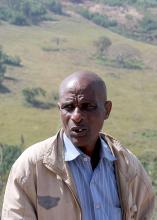
Elias Tola has been part of the food-for-work and cash-for-work programs that have helped to restore his farmland and bring roads into the Boricha District. (Credit: Evelyn Rempel Petkau)
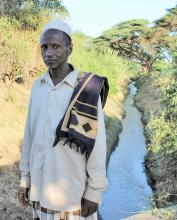
Ahimed, head of the water user association in his community, stands near the channel that diverts water from the river and brings life to his community. He speaks with pride about the difference this six-kilometre channel has made to their lives, bringing not only water, but food security, a school, a clinic and dignity. (Credit: Evelyn Rempel Petkau)


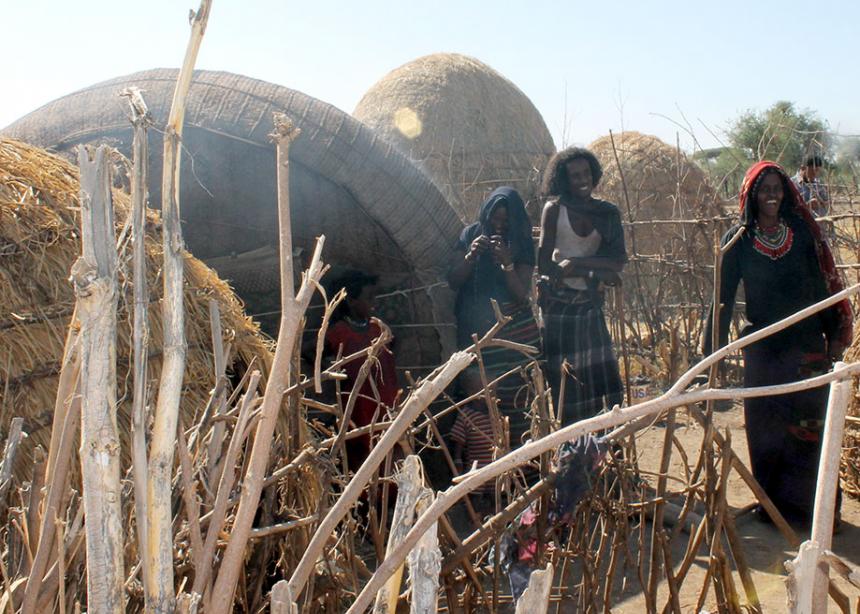

Add new comment
Canadian Mennonite invites comments and encourages constructive discussion about our content. Actual full names (first and last) are required. Comments are moderated and may be edited. They will not appear online until approved and will be posted during business hours. Some comments may be reproduced in print.